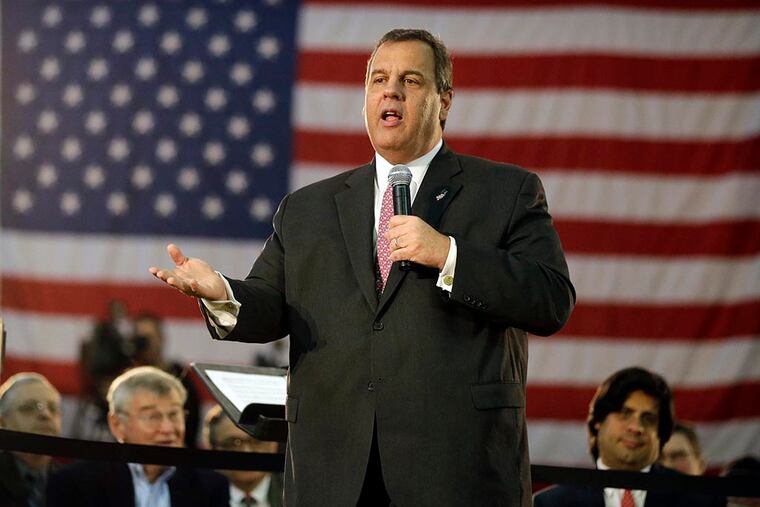Christie says Exxon settlement ensures cleanup
SOMERVILLE, N.J. - Gov. Christie on Tuesday defended the settlement of a lawsuit with ExxonMobil Corp. for billions of dollars less than the state had been seeking, saying the deal would ensure the cleanup of polluted land.

SOMERVILLE, N.J. - Gov. Christie on Tuesday defended the settlement of a lawsuit with ExxonMobil Corp. for billions of dollars less than the state had been seeking, saying the deal would ensure the cleanup of polluted land.
At a town-hall-style meeting in Somerset County, Christie said news coverage of the state's agreement to settle the decade-old lawsuit with ExxonMobil for $225 million - compared with $8.9 billion the state sought at trial last year - did not highlight a requirement that the company pay for remediation.
"The idea that this has been reported as a $225 million settlement - that's $225 million clear of fixing the problem they caused," Christie told more than 400 people in an elementary school gymnasium.
He said the state would determine whether ExxonMobil's remediation was adequate and that there was no cap on what the company might have to pay.
"It's actually a really good settlement," Christie said.
Democratic lawmakers have said they will sue to block the deal.
Somerset marked Christie's latest stop in his campaign for more changes to the long-underfunded state pension system. The Republican governor, a potential 2016 presidential candidate, also used the meeting to highlight his decision to expand Medicaid under the Affordable Care Act.
Christie, who argued that worker benefits must be further curbed for the state to afford the system, spoke about the settlement in response to a question from a community college professor, who suggested the state would have more money if it weren't giving breaks to businesses.
Christie attacked the New York Times, which first reported New Jersey would settle for much less than $8.9 billion, stirring controversy before the state announced the deal last week. The governor said the paper does not want to give him positive coverage.
"If you read the New York Times, you would never know" about the cleanup requirement, Christie said. "The Times would actually have to say something nice about me."
A spokesman for the New Jersey Attorney General's Office said ExxonMobil had a "separate legal obligation" to remediate contaminated refinery sites in Bayonne and Linden. Under state administrative orders dating to the 1990s, ExxonMobil "must thoroughly investigate and fully remediate contamination" to standards specified by the state, said the spokesman, Leland Moore.
"The proposed settlement making news right now reaffirms that this required investigation and remediation work will be performed at ExxonMobil's expense under the state's supervision," Moore said. He said the cost of that work would be "substantial."
ExxonMobil CEO Rex Tillerson said Tuesday that the company had been cleaning up the affected sites for 10 years, according to the Associated Press. "So the lawsuit that's been talked about has nothing to do with cleanup," Tillerson told the AP. "We're already doing that."
Jeff Tittel, director of the New Jersey Sierra Club, contended Tuesday that the settlement does not require ExxonMobil to clean up the contamination to the extent it previously was ordered to do.
"This is a good deal, yeah, for Exxon," Tittel said.
As Christie praised the deal, he said his acting attorney general, John J. Hoffman, "makes these decisions. So I can't take credit for the good decision, either."
The state did employ a New Orleans-based firm to work on the case. Moore estimated that about 20 percent of the settlement would go toward litigation costs but said the amount had not been finalized.
The settlement is subject to a 30-day public comment period and must be approved by a judge.
Christie did not refer to the accusation levied last week by former New Jersey Environmental Protection Commissioner Bradley Campbell, who charged in a Times commentary that Christie chief counsel Christopher Porrino "elbowed aside the attorney general . . . and cut the deal favorable to Exxon."
Campbell, who authorized the lawsuit against ExxonMobil in 2004, called the settlement a "disgrace." Christie's office has called Campbell's allegations "baseless."
As he promoted his fiscal record Tuesday, Christie singled out his decision to expand Medicaid, saying it had reduced the demand for hospital charity care. His proposed budget for the fiscal year beginning July 1 includes $150 million less in hospital aid.
"Expanding Medicaid was the right decision for New Jersey. I thought it was right at the time," Christie said, without directly mentioning Obamacare. "It's helping save us money, our state taxpayers, by taking more federal dollars, but also by having more people covered, so they don't go for their primary care in a hospital emergency room, which is the most expensive place for them to go."
New Jersey is one of 28 states that expanded Medicaid under the health-care law. Republicans who opted against expansion include several who may rival Christie in a presidential race: Wisconsin Gov. Scott Walker, Louisiana Gov. Bobby Jindal, and former Texas Gov. Rick Perry.
On another topic that could stir debate in a 2016 campaign, Christie expressed support for changing federal law to allow states to collect sales tax on online purchases, saying exempting Internet retailers was "not fair to the brick-and-mortar stores who are trying to make a living."
"This is a federal problem, and I've been one of the governors who's advocated what I call tax fairness," Christie said. He noted New Jersey's agreement with Amazon.com, which has a physical presence in the state, requiring the online retailer to collect sales tax.